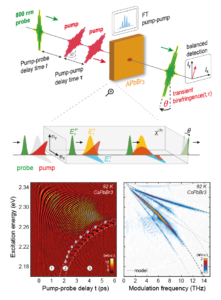
Optoelectronic devices, such as photovoltaics or light-emitting diodes, are based on the interaction of light with charges in the active material. Lead halide perovskites (LHPs) have emerged as excellent materials for optoelectronics, but mysteries remain as to how these materials interact with light. In the X.-Y. Zhu group at Columbia University, S. Maehrlein and coworkers developed a multidimensional spectroscopic method (2D-OKE) to observe the nearly instantaneous responses of LHPs to propagating light fields. This novel method has allowed us to precisely trace a nonlinear material response resulting from the mixing of different light components overtaking each other during propagation. The resulting oscillatory signals could be easily confused with collective motions of ions or molecules, but are quantitatively accounted by strong nonlinear mixing and polarization-dressed light propagation in single-crystal LHPs. ![]()
Original publication in PNAS: S.F. Maehrlein et al. “Decoding ultrafast polarization responses in lead halide perovskites by the two-dimensional optical Kerr effect” (2021)